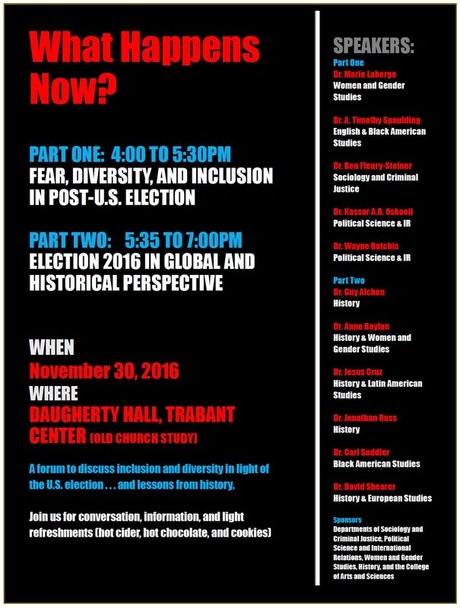
Education, I firmly believe, is my primary path forward from this election. I want to never stop learning, but I also want to teach, to engage in discussion, to contextualize, historicize, and yes, fact-check, even in this possibly post-truth world.
So I was wondering what I could do to contribute to this great event. Together with a band of like-minded graduate students (namely, the inspiring Kiersten Mounce and the wonderful Elizabeth Jones-Minsinger), I got to work on a document we could distribute, full of information, further reading, links to charities and organizations, and ideas for exercising your active citizenship over the next four years.
Post-Election Resources:
- Civil rights, liberty, and freedom for all. Civil rights includes environmental justice and fighting climate change.
- Economic equality and prosperity for all
- Protection of democracy and fighting corruption in politics
- An informed citizenry as key to all of the above.
Click here to access the full document
- Invest in your community! Join nearby religious or faith groups that work toward causes you believe in; Support local businesses, woman-owned businesses, black- and minority-owned businesses; Join or start local chapters of national organizations; Volunteer at local charities (some listed later here), and get to know your neighbors -- ask them for sugar and give them those extra cookies you baked with it that you don’t even want and know you’ll just eat at 1AM if they sit in your kitchen overnight. Find out what your bank is doing with your money and move it to a different one (maybe a Credit Union!) if you don’t agree with their investments.
- Investigate your carbon footprint and work to shrink it--reduce, recycle and reuse can be awesome. My favorite way to do this is: instead of buying corporate conglomerates’ beer, invest in a glass growler and fill it up with beer from local breweries. Ditto with investing in a gorgeous water bottle to replace plastic ones -- and a favorite coffee mug with lid that you get filled at coffee shops instead of paper cups. (There are often financial savings here: Saxby’s offers %10 off if you bring your own cup, and %15 off if you bring a Saxby’s reusable cup- many other coffee shops offer discounts too.)
- Get together with friends, classmates, or organizations to offer to paint over any hateful graffiti that you might see or might be found in your neighborhood; beautify your home and connect with people at the same time. Or just make some public art on your own for yourself or as a local monument. Mark ground that is sacred to you and consecrate it with flowers, rocks, or other handy and meaningful markers.
- Check out Volunteer Match, a great way to find with nonprofits that need your help, time, and/or expertise.
- Take a moment to read the Southern Poverty Law Center's “Ten Ways to Fight Hate: A Community Response Guide”
- Or, read Yale Professor Timothy Snyder’s 20-point list of lessons from the 20th century to take into the 21st.
 RSS Feed
RSS Feed